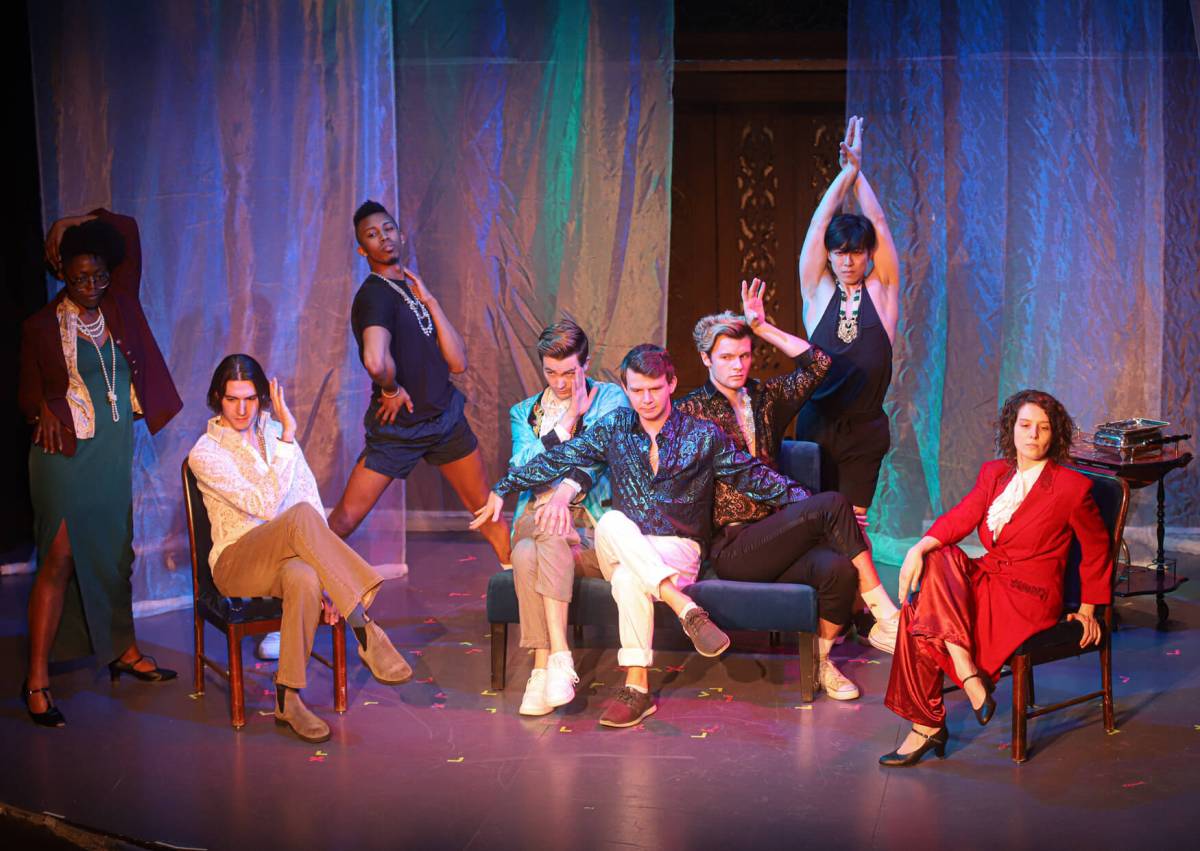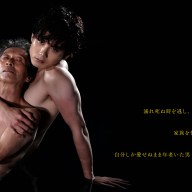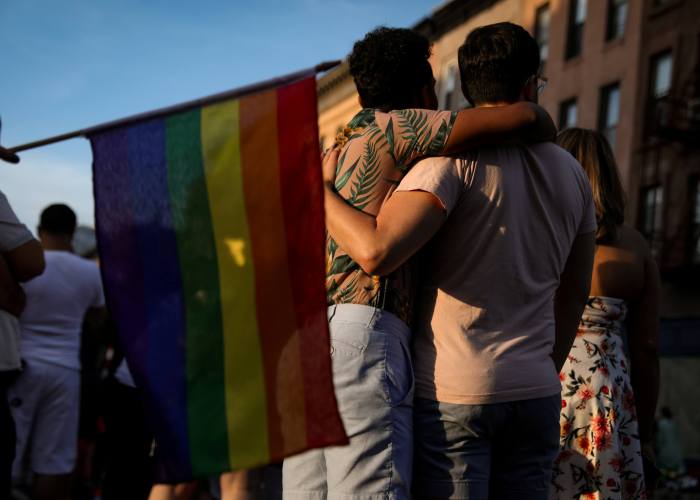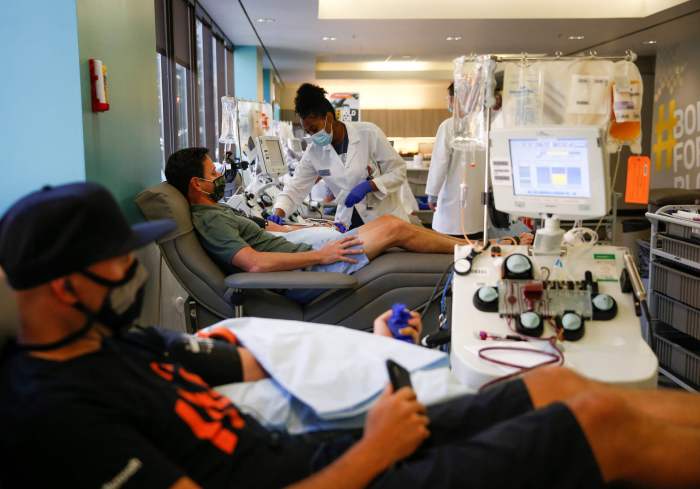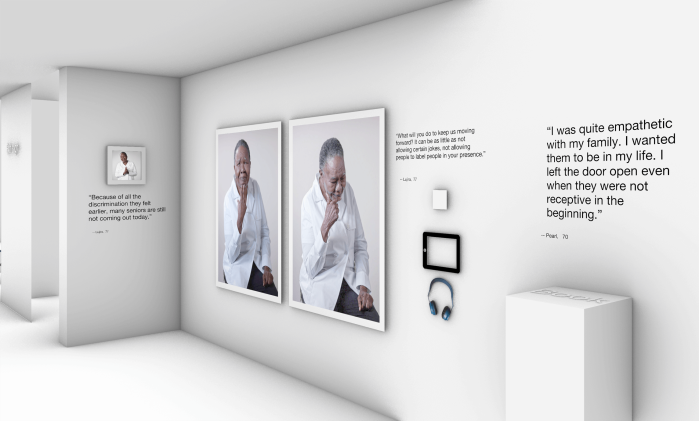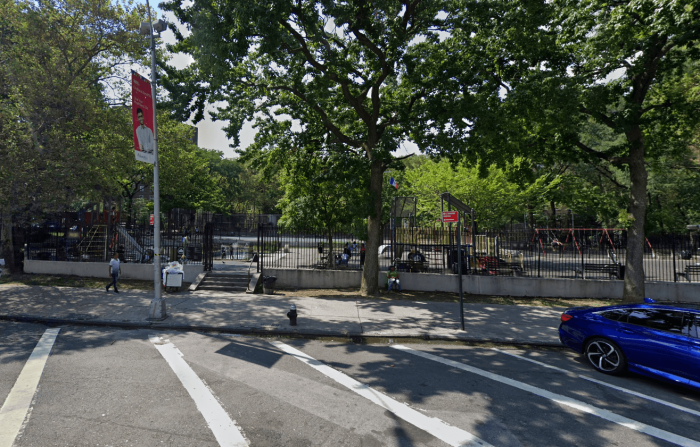Oscar Wilde’s most popular — and most-produced — play, “The Importance of Being Earnest” has a history of modern productions that toy with gender expression. From Broadway productions with Ellis Rabb and Brian Bedford as Lady Bracknell, to all-male productions at the Abbey Theater and at The Duplex during the latter’s short stint as a theater venue, this is not a new concept. Yet it requires delicate handling because there is a fine line between a concept and a gimmick.
The new, all-male, all gay version,“The Importance of Being Earnestly LGBTQ+” falls on the gimmick side of the line and leaves one wondering what the point was in revising this classic in this way. Yes, love is love and all that for a modern audience, and Wilde was, of course, very cognizant of social and gender issues. Yet, like fellow Victorian and social critic George Bernard Shaw, Wilde was determined to use comedy to show the true power of women in a male-dominated world. Wilde’s story of deceit, excessive romanticism, courtship games, societal conventions, and a romantic hero whose lineage is traced to a handbag in a railway station was written to satirize the societal structures against which Wilde chafed, and suffered from, as a gay man. Given the inherent ridiculousness of the plot, Wilde himself in 1895 wanted the piece played — you should pardon the expression — straight. For all its frothy comedy, “Earnest” has an undercurrent of outrage and anger, which is what gives satire its bite.
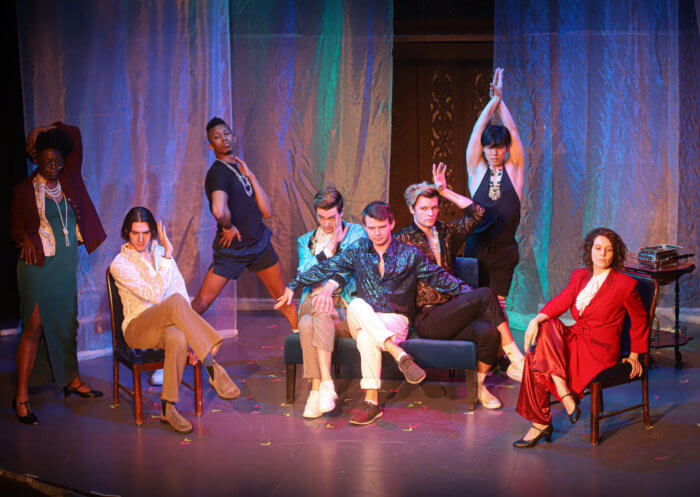
The fundamental disconnect in this production, adapted and directed by Maarten Cornelis, is that the play cannot authentically translate to a gay version. Wilde’s satire depends on an audience’s ability to see limiting cultural norms as inherently false, if not fully corrupt. When those have been jettisoned from the get-go, there is no base on which to build the satire. The tension built on the male-female dynamic is gone, and the edge is irredeemably blunted.
This production does preserve the familiar plot, only changing the women to men. Jack Worthing, the baby who was found in a handbag and raised as a gentleman by a kindly Mr. Cardew, has taken on an alter ego, “Earnest,” so he can leave his country home where he cares for his ward Cecily Cardew (Here named Cecil), and secretly woo Gwendolyn Fairfax (Here named Gwyn), offspring of the imperious Lady Bracknell. His friend Algernon Moncrief, Lady Bracknell’s nephew, has a similar ruse. He has a fake friend Bunbury, whom he uses to escape any situation, as in being abruptly called away to tend to him. When Algernon learns of Cecil, he decamps to the country to woo her in the guise of Earnest, Jack’s wayward brother.
To compound the dilemma, both Gywn and Cecil declare they can only love a man named Earnest and each believes themself to be engaged to the fictional Earnest, and when they discover they have been deceived, the unite against Jack and Algernon. All of this is played out under the controlling presence of the stentorian Lady Bracknell, the essence of the stalwart Victorian ethic of propriety and class. She alone will determine what’s right for her son and her nephew to preserve the aristocracy. With a handbag as a parent, Jack cannot marry Gwyn, until Jack sets terms for Cecil marrying Algernon. (Cecil comes with a large fortune which makes Lady B. change her tune on the spot.) Moreover, as Wilde pointedly details, Lady Bracknell is all the more fierce in her defense of the status quo because she managed to rise from the lower class to the peerage. Hypocrisy steeped in self-righteousness is something that Wilde decried throughout his life and work, and it’s why we laugh at Lady Bracknell.
In skirting the gender issue, Cornelis has directed both Gwyn and Cecil as highly effeminate men, reinforcing Wilde’s argument of the power of the female dynamic as opposed to a same sex dynamic. Wilde’s Cecily is romantic, but she’s also obsessed with wickedness and believes she can reform the wayward Earnest. She is the only character in the piece that doesn’t speak in epigrams, and what makes her interesting is the juxtaposition of a naïveté, clear objective and how she can use her gender to her advantage. Cornelis’ Cecil is all over the place, a collection of mannerisms that lack a center. Gwyn fares better as a gay male. He is the more worldly of the two, but archness and attitude are weak compared to the calculations required of a Victorian woman on the marriage market. As a result, the scene between the two of them when they fight about which of them is engaged to Earnest over tea is not the classic comedy battle royal where Wilde reveals what he sees as the darker side of female competition but feels like one of the brawling catfights from the 80s TV show, “Dynasty.”
There are other confusing elements as well. The setting has been transformed to New York, but the language remains very British (“railway station” versus “train station” for instance), and there really is no need to add forced Grindr jokes. For some reason, Cornelis has added two dancers who present as male in high heels and fur jackets who shadow Lady Bracknell everywhere she goes. They occasionally complete some of Lady Bracknell’s lines, but beyond that they are baffling. (I couldn’t stop thinking of the two eunuchs who shadowed Chita Rivera in “The Visit,” but that was much darker and abstract.) More misguided still, as Lady Bracknell, Denise Turkan is earthbound and mugging, seeming to have arrived on the scene from the shtetl rather than Grosvenor Square.
If this production proves one thing, though, it’s that “Earnest” can take a beating and still entertain. Thanks to some of the members of the hardworking cast, there are still glimmers of the original in there, and what’s there works. Preston Fox as Jack is a comic leading man in full command of his comic talent. Kenon Veno has a way with a withering look and a telling subtle glance that give Gwyn some depth and star power. Clint Blakely as Algy swings between bitchy Chelsea queen and puppy dog and somehow manages to be endearing nonetheless. Lauren E. King as Miss Prism, the governess who lost the baby years ago, finds believable longing in her love for the Reverend Chausable, a confident Marie Anello, and her defense of the three-volume novel, one of Wilde’s hilarious jabs at the popular literature of his day.
Plays are not sacrosanct, and concept productions are nothing new. Still, to be effective, a concept must serve both the new vision and the original material. With a concept more gratuitous than organic, particularly when reclassifying a classic, the result feels like being trapped at a party where you know everyone, but everyone is a bit off tonight.
THE IMPORTANCE OF BEING EARNESTLY LGBTQ+ | The Actors Temple | 339 West 47th Street | Tuesdays at 7 p.m. through December | $49.50 & $79.50 | Telecharge.com or 212-239-6200 | 2 hours, 30 minutes, 1 intermission

